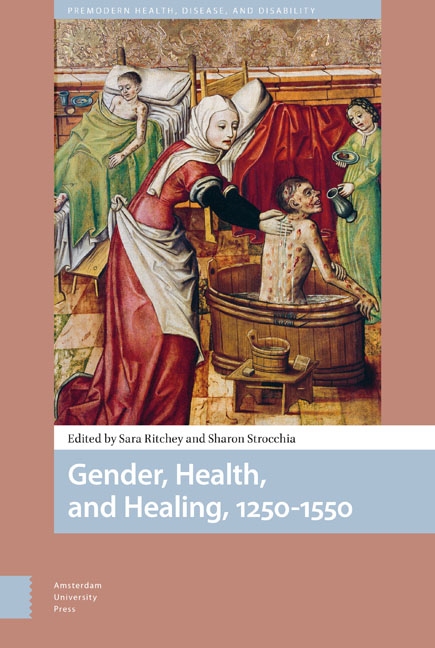Book contents
- Frontmatter
- Contents
- List of Figures and Tables
- Acknowledgments
- Abbreviations
- Introduction: Gendering Medieval Health and Healing: New Sources, New Perspectives
- Part 1 Sources of Religious Healing
- 1 Caring by the Hours: The Psalter as a Gendered Healthcare Technology
- 2 Female Saints as Agents of Female Healing: Gendered Practices and Patronage in the Cult of St. Cunigunde
- Part 2 Producing and Transmitting Medical Knowledge
- 3 Blood, Milk, and Breastbleeding: The Humoral Economy of Women's Bodies in Medieval Medicine
- 4 Care of the Breast in the Late Middle Ages: The Tractatus de passionibus mamillarum
- 5 Household Medicine for a Renaissance Court: Caterina Sforza's Ricettario Reconsidered
- 6 Understanding/Controlling the Female Body in Ten Recipes: Print and the Dissemination of Medical Knowledge about Women in the Early Sixteenth Century
- Part 3 Infirmity and Care
- 7 Ubi non est mulier, ingemiscit egens?: Gendered Perceptions of Care from the Thirteenth to Sixteenth Centuries
- 8 Domestic Care in the Sixteenth Century: Expectations, Experiences, and Practices from a Gendered Perspective
- 9 Bathtubs as a Healing Approach in Fifteenth-Century Ottoman Medicine
- Part 4 (In)fertility and Reproduction
- 10 Gender, Old Age, and the Infertile Body in Medieval Medicine
- 11 Gender Segregation and the Possibility of Arabo-Galenic Gynecological Practice in the Medieval Islamic World
- Afterword: Healing Women and Women Healers
- Contributors
- Index
11 - Gender Segregation and the Possibility of Arabo-Galenic Gynecological Practice in the Medieval Islamic World
Published online by Cambridge University Press: 23 June 2021
- Frontmatter
- Contents
- List of Figures and Tables
- Acknowledgments
- Abbreviations
- Introduction: Gendering Medieval Health and Healing: New Sources, New Perspectives
- Part 1 Sources of Religious Healing
- 1 Caring by the Hours: The Psalter as a Gendered Healthcare Technology
- 2 Female Saints as Agents of Female Healing: Gendered Practices and Patronage in the Cult of St. Cunigunde
- Part 2 Producing and Transmitting Medical Knowledge
- 3 Blood, Milk, and Breastbleeding: The Humoral Economy of Women's Bodies in Medieval Medicine
- 4 Care of the Breast in the Late Middle Ages: The Tractatus de passionibus mamillarum
- 5 Household Medicine for a Renaissance Court: Caterina Sforza's Ricettario Reconsidered
- 6 Understanding/Controlling the Female Body in Ten Recipes: Print and the Dissemination of Medical Knowledge about Women in the Early Sixteenth Century
- Part 3 Infirmity and Care
- 7 Ubi non est mulier, ingemiscit egens?: Gendered Perceptions of Care from the Thirteenth to Sixteenth Centuries
- 8 Domestic Care in the Sixteenth Century: Expectations, Experiences, and Practices from a Gendered Perspective
- 9 Bathtubs as a Healing Approach in Fifteenth-Century Ottoman Medicine
- Part 4 (In)fertility and Reproduction
- 10 Gender, Old Age, and the Infertile Body in Medieval Medicine
- 11 Gender Segregation and the Possibility of Arabo-Galenic Gynecological Practice in the Medieval Islamic World
- Afterword: Healing Women and Women Healers
- Contributors
- Index
Summary
Abstract
There is a widespread assumption that, in the medieval Islamic world, a cultural emphasis on female modesty and gender separation resulted in male physicians never having the expectation or opportunity to put their gynecological and obstetrical knowledge to practical use. However, a wide range of textual evidence suggests that, in many communities, there was a broad acceptance of intimate interactions between male practitioners and female patients. These interactions included verbal consultations, manual examinations, and physical procedures relating to fertility and childbirth, as well as diseases of the sexual organs. Some male authors of medical texts also convey the expectation that the information in their texts would come to be known and utilized by women themselves, through female medical intermediaries.
Keywords: female patients, gynecology, Islamic medical ethics, midwives, modesty, Sharia
The gynecological section of the only twentieth-century printed edition of al-Rāzī's al-Manṣūrī fī al-ṭibb (Rhazes’ Liber medicinalis ad almansorem) includes a discreetly written editorial footnote. Glossing al-Rāzī's treatment for retained menstruation, the modern editor remarked at the line, ‘He gives to the [female] patient’:
It is so in all versions. In these chapters which address women and those diseases of the menses and of the uterus which befall them, the author writes as though speaking about a male [practitioner]. Hence ‘he gives to the patient’, ‘he administers’, ‘he inserts’, ‘he feeds’, etc. We have tried to correct all of the words without pointing out every mistake in the footnotes.
By characterizing the masculine verbs he found in the text as ‘mistakes’, the editor articulated an assumption commonly found in modern scholarship about the practice of gynecology in the medieval Islamic world. The editor could not imagine that a male physician would have such intimate contact with women. He therefore chose to ‘correct’ the masculine verbs by substituting feminine and passive verb forms, so that it appears as though the female patient performs these actions on her own, or that a second woman is present to act as a medical intermediary.
- Type
- Chapter
- Information
- Gender, Health, and Healing, 1250–1550 , pp. 291 - 314Publisher: Amsterdam University PressPrint publication year: 2020
- 2
- Cited by



